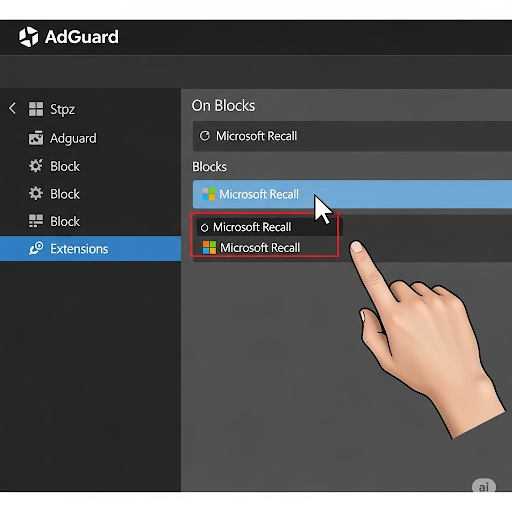AdGuard company announced plans to block the new Microsoft Recall function in Windows, which records user screen activity. The decision was made for privacy protection and data security considerations.

G. Ostrov
Developers of the popular ad blocker AdGuard announced their intention to block the controversial Microsoft Recall function in the Windows operating system. This decision came as a response to growing user concerns about privacy and data security when using Microsoft's new technology.
What is Microsoft Recall
Microsoft Recall is an artificial intelligence function integrated into Windows that automatically creates user screen snapshots at regular time intervals. The system analyzes screen content, including text, images, and application interfaces, creating a detailed log of user activity.
Microsoft positions the function as a productivity-enhancing tool that allows users to easily find and return to previously viewed content. Recall uses local machine learning to analyze screenshots and create a searchable database of user activity.
Privacy Concerns
Despite Microsoft's assurances about local data storage, the Recall function has raised serious concerns in the information security specialist community and privacy advocates. Main issues include:
Potential vulnerability to attacker attacks who could gain access to detailed user activity history, including confidential information, passwords, and personal data.
Possibility of unintentionally saving sensitive information such as banking data, medical records, or corporate documents, even if the user didn't plan to archive them.
Risks to corporate security, as the function could record confidential business information, violating company security policies.
AdGuard's Position
The AdGuard team expressed serious doubts about the necessity and security of the Recall function. In an official statement, the company emphasized that the blocking decision was made to protect users from potential privacy threats.
AdGuard representatives noted that the Recall function contradicts data minimization principles and could create unnecessary risks for users. The company plans to integrate Recall blocking into its desktop and mobile device products.
Technical Aspects of Blocking
AdGuard plans to use several methods to prevent Microsoft Recall from working. Blocking will be implemented at the network request level, system processes, and interaction with Microsoft cloud services.
The company's technical specialists are developing filters that will prevent Recall function activation and block related network connections. Users will be able to control these settings through the AdGuard interface.
Community Response
AdGuard's decision received support from many cybersecurity experts and organizations defending digital privacy rights. Microsoft Recall critics welcomed the company's initiative as an important step in protecting user data.
At the same time, some users expressed concern that blocking potentially useful functions might limit their choices. AdGuard emphasizes that blocking will be optional and users can disable it if desired.
Alternative Solutions
For users seeking functionality similar to Recall but with better privacy protection, alternative solutions from third-party developers exist. These tools offer local activity tracking with more transparent privacy policies and user control.
AdGuard recommends users carefully study privacy policies of any activity tracking tools before using them.
Official AdGuard website: https://adguard.com/
In case of any problems, please contact us, we will help quickly and professionally!




